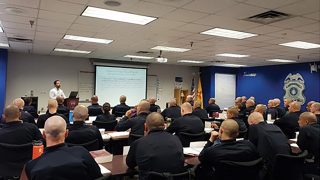
When my husband was on the job, our relationship struggled with communication and connection, not unlike many of the law enforcement couples I help in my professional work. As a cop wife, I often felt frustrated because I wanted so badly to connect with my husband — despite him being exhausted and grumpy and not wanting to go anywhere much of the time. I found myself emotionally shutting down or starting arguments over insignificant things. This was just as frustrating for my husband, who was simply trying to enjoy his time off with me. Unfortunately, we both lacked the tools to counter these issues early in our relationship. Over time, we fumbled through it (as many do) and ultimately learned better ways of communicating and connecting. I consider our relationship very fortunate to have made it through his law enforcement career.
Police work encompasses a myriad of stressors that place substantial physical, mental and emotional demands on officers. The ways in which these stressors are managed can directly impact the officer’s family system. Additionally, officers are trained, conditioned and reinforced through on-the-job experience to maintain a protective stance, which runs counter to the vulnerability and trust that are necessary to nurture healthy personal relationships. This is why law enforcement marriages and family relationships can be particularly difficult. Furthermore, officers, spouses and families receive little to no training on how to maintain a healthy relationship despite these challenges.
Studies have reported communication, emotional regulation and day-to-day family activities as major concerns for the marriage and family life of officers.[1]Pamela Brodie and Christie Eppler. “Exploration of Perceived Stressors, Communication, and Resilience in Law Enforcement Couples.” Journal of Family Psychotherapy, January 2012, pp. 20–41.[2]Nicole A. Roberts and Robert W. Levenson. “The Remains of the Workday: Impact of Job Stress and Exhaustion on Marital Interaction in Police Couples.” Journal of Marriage and Family, November … Continue reading While this is probably not surprising to many of you reading this article, it helps to understand why these issues occur and what steps you can take to mitigate the negative impact of job stress spillover.
Communication
Healthy communication is foundational in any healthy relationship. This involves listening, validating and connecting with one another on a consistent basis. The challenge is that our ability to effectively communicate is directly impacted by our physical, mental and emotional bandwidth. For police officers, daily and cumulative organizational and operational stressors significantly reduce their bandwidth throughout their shift and across their career. Additional variables — such as critical incident and trauma exposure, on-duty communication skills that spill over at home and personal stressors — can further impact your ability to effectively communicate. The family impact: spouses and kids are often met with the exhausted version of their loved one coming home. The good news is that there are things you can do to enhance communication during the workweek and on your days off.
Each day, take inventory on your available bandwidth. If you are tapped out, communicate that with your spouse so that they can support you and help with the kids when you get home. A simple phrase, such as “I need 10 minutes,” can help your loved one know what to expect when you walk in the door so they can give you the time and space to power down after work prior to re-engaging with the family. If you have young kids, establish a routine such as saying hello and giving them hugs when you walk through the door before you take a few minutes to yourself. This routine can be universal for any family member who had a tough day. Leading by example is one of the ways you can make a positive impact on your spouse and kids.
Make time to connect regularly. This could be on a day off or built into your workweek, whatever works best for you both. Schedule at least 20 minutes to catch up with one another about how you are doing — no television, cellphones or other distractors. Face each other and make eye contact as you talk. Avoid filling this time by only talking about the schedule for the week. The goal here is to spend most of this time focused on connection-oriented (rather than task-oriented) communication. Do this with your spouse and your kids.
If you get feedback that you don’t listen or always try to fix things, your family is probably trying to tell you that they just need a sounding board or some emotional validation. It is often most helpful to let your spouse or child do their best to identify and solve their own problems while offering them emotional and/or tangible support along the way. To give yourself a better sense of what they are expecting from you, beginning the conversation with something like “Do you need me to help you or hear you?” can set the stage for both you and your family member.
Learn to fight fair. Healthy communication does not mean zero conflict. In fact, conflict is actually a great way to enhance communication and foster trust, connection and intimacy in your relationship. This means setting some ground rules. For example, instead of attacking each other, attack the issue. Do not fight to win; seek to understand each other’s perspective. Take a time-out if emotions are escalating and be sure to return to the conversation (do not brush it under the rug). This does not mean you abruptly walk away. Say something like “It seems like we are both feeling upset about this. Let’s take a time-out before we keep talking about this.” Refrain from name calling, labeling or using words like “always” or “never.” If you know ahead of time that the conversation will be difficult, schedule time to talk rather than trying to quickly address the issue.
Emotional regulation
As humans, we are more than our thoughts. Much of how we connect and communicate with one another is rooted in the emotions we feel and those we perceive others feeling. This can be tricky, because emotional compartmentalization and avoidance are how many cops manage their emotions on duty. Additionally, officers are trained and conditioned to not allow emotions to cloud their judgment or decision-making. In some cases, emotions can compromise officer safety. This can make it difficult to transition from this protective stance to the emotional vulnerability that is necessary for connection and intimacy in relationships. Other factors, such as critical incidents, trauma exposure, and other organizational and operational stressors, can wear you down emotionally. At home, this can look like you are emotionally disengaged, numb, disinterested or short-fused with your spouse and children.
Simple things such as fatigue and hunger can influence how well you regulate your emotions. Always take inventory with yourself to see where you stand in these areas. Are you sleep-deprived and in need of some rest? Do you need a half-day to just relax a bit? When was the last time you ate? How much sugar and caffeine are you consuming? How much alcohol are you drinking? Make the adjustments needed.
Take a breath. Nothing fuzzy-wuzzy here — breathing is how we communicate to our body that we are OK. On occasion, your body can misfire the fight-or-flight response or you can have difficulty powering down outside of work. It is important to understand that your nervous system does not distinguish between types of threats; the biological response is the same. If you are feeling irritable or short-tempered, take a few minutes to focus on your breathing. Using box breathing, diaphragmatic breathing and other breathing tools is effective. Generally, a longer exhale and a shorter inhale pattern of breathing helps calm your body and mind. As with any skill, consistent practice builds proficiency. Train your breathing daily by making it part of your daily routine. For example, focus your breathing for a few minutes when you wake up, when you get to work before you exit your vehicle, at the end of your shift before you drive home and in your driveway before you walk into your home.
Physical activity and exercise help with mood and emotional regulation. Think of it as physically burning off the stress hormones that accumulate throughout your day. Additionally, our bodies produce natural mood enhancers and pain relievers when we are physically active. You don’t have to do intensive exercise for a long period of time daily. Just get your body moving for at least 20 minutes. If you were involved in a critical incident or had a particularly tough day at work, engage in some cardiovascular exercise before you go home. If you are feeling irritable or angry, try something more rigorous, like boxing, jiu-jitsu or CrossFit.
It is also a good idea to avoid stimulants, alcohol and other substances when experiencing emotional discomfort. These substances can prevent you from feeling or cause your emotions to spill over in ways that are not helpful to you, your spouse or your kids. If you have difficulty abstaining from substances when trying to manage difficult emotions, consider utilizing additional resources such as Peace Officer’s Fellowship, peer support, law enforcement chaplains, or licensed and culturally competent mental health professionals to gain additional support and tools.
The takeaway
Police work is tough on you and your relationships. While this is generally accepted by cops and their families, it does not mean you are all doomed. Just as you train to keep yourself safe on the job, you must train to keep yourself and your family healthy off the job. This requires consistent, intentional effort by you, your spouse and your children. Start by communicating what is working well and what could be better. Communicate with your loved ones to establish a routine at home that is conducive to fostering and maintaining a relationship rooted in communication and connection. Be safe and be well.
As seen in the April 2024 issue of American Police Beat magazine.
Don’t miss out on another issue today! Click below:
References
| 1 | Pamela Brodie and Christie Eppler. “Exploration of Perceived Stressors, Communication, and Resilience in Law Enforcement Couples.” Journal of Family Psychotherapy, January 2012, pp. 20–41. |
|---|---|
| 2 | Nicole A. Roberts and Robert W. Levenson. “The Remains of the Workday: Impact of Job Stress and Exhaustion on Marital Interaction in Police Couples.” Journal of Marriage and Family, November 2021, pp. 1052–1067. |






